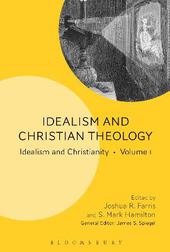
|
Idealism and Christian Theology: Idealism and Christianity Volume 1
Hardback
Main Details
Description
In the recent history of philosophy few works have appeared which favorably portray Idealism as a plausible philosophical view of the world. Considerably less has been written about Idealism as a viable framework for doing theology. While the most recent and significant works on Idealism, composed by the late John Foster (Case for Idealism and A World for Us: The Case for Phenomenological Idealism), have put this theory back on the philosophical map, no such attempt has been made to re-introduce Idealism to contemporary Christian theology. Idealism and Christian Theology is such a work, retrieving ideas and arguments from its most significant modern exponents (especially George Berkeley and Jonathan Edwards) in order to assess its value for present and future theological construction. As a piece of constructive philosophical-theology itself, this volume considers the explanatory power an Idealist ontology has for contemporary Christian theology.
Author Biography
Joshua R. Farris is Assistant Professor of Theology at Houston Baptist University, Smith College of Liberal Arts and the Academy. He is the chief editor (with Charles Taliaferro) for Ashgate Research Companion to Theological Anthropology (2015). S. Mark Hamilton is a PhD candidate University of Bristol, UK. He is co-editor of New England Dogmatics: A Systematic Collection of Questions and Answers in Divinity (2014). James S. Spiegel is a Professor of Philosophy and Religion at Taylor University in Upland, Indiana, USA. His books include The Love of Wisdom (2010), Faith, Film, and Philosophy (2007), Hypocrisy: Moral Fraud and Other Vices (1999), and the award-winning How to be Good in a World Gone Bad (2004).
Reviews[A] well-constructed collection of articles aimed at showing the relevance and plausibility of theistic idealism ... A book for the discerning reader, I recommend it to the student and to the scholar. * Philosophy of the Cross * The 'Idealism and Christianity' series is the first of its kind, an inauguration of a rich conversation in metaphysics that manages to be coherent, insightful, and accessible to students and professors alike. * Journal of Biblical and Theological Studies * This anthology is of excellent analytical quality and strives for historical sensitivity. The overarching agreement between this papers means that each essay hangs together well and the collection flows through various loci of Christian doctrine smoothly. * Reviews in Religion and Theology * The philosophical idealists addressed in this volume teach that minds are most real, that the physical world depends for its being on the mind (especially the mind of God), and that matter is a fiction when depicted as a substance that undergirds reality. Few late-modern thinkers have found their arguments convincing. But in the pages of this volume a diverse array of first-rate metaphysical minds seek to rehabilitate some of the features of the idealism of Bishop George Berkeley and the Rev. Jonathan Edwards for contemporary theology. Their efforts will surely generate a good deal of debate, but they deserve careful attention from intellectual historians, philosophers, and constructive theologians. * Douglas A. Sweeney, Professor of Church History and the History of Christian Thought, Trinity Evangelical Divinity School, USA * In a materialist age, the idealist notion that esse est percipi aut percipere ("to be is to be perceived or to perceive") is not a popular one. Yet, a number of brilliant thinkers in the Christian tradition have argued that what we call matter is really a set of ideas in the mind of God. This solid collection of essays puts two of the most prominent idealists, George Berkeley and Jonathan Edwards, in dialogue with each other. This book well deserves to be the catalyst for continuing theological discussion of idealist metaphysics. * Hans Boersma, J.I. Packer Professor of Theology, Regent College, Canada * Idealistic metaphysics is the oxygen of speculative theology. Any faith seeking reason must wrestle with the philosophical significance of those idealistic arguments that have shaped Christian theology since its inception in the school of Alexandria. This volume focuses on two of the greatest modern proponents of an idealistic metaphysics within the Christian tradition: Edwards and Berkeley. The essays here offer a fascinating and rich foray into some of the key questions of philosophical theology. Idealism may not be fashionable but its persisting power is admirably demonstrated in this fine collection. * Douglas Hedley, Reader in Hermeneutics and Metaphysics and Fellow of Clare College, University of Cambridge, UK *
|